The Globalization Debate: Economic and Social Implications
VerifiedAdded on 2022/08/25
|18
|3890
|14
Essay
AI Summary
This essay delves into the multifaceted globalization debate, examining its impact on various aspects of the global economy and society. The introduction defines globalization as the integration of markets and interconnectedness of national economies, highlighting its historical context and the emergence of a debate surrounding its effects. The essay explores the advantages of globalization, including economic growth through free trade, increased equality, poverty reduction through job creation, and environmental improvements through technology transfer. Conversely, it addresses the disadvantages, such as increased inequality, potential economic crises, and environmental concerns. The essay uses statistical evidence and real-world examples to support its arguments, offering a comprehensive analysis of the complex and ongoing debate surrounding globalization's impact on the world.
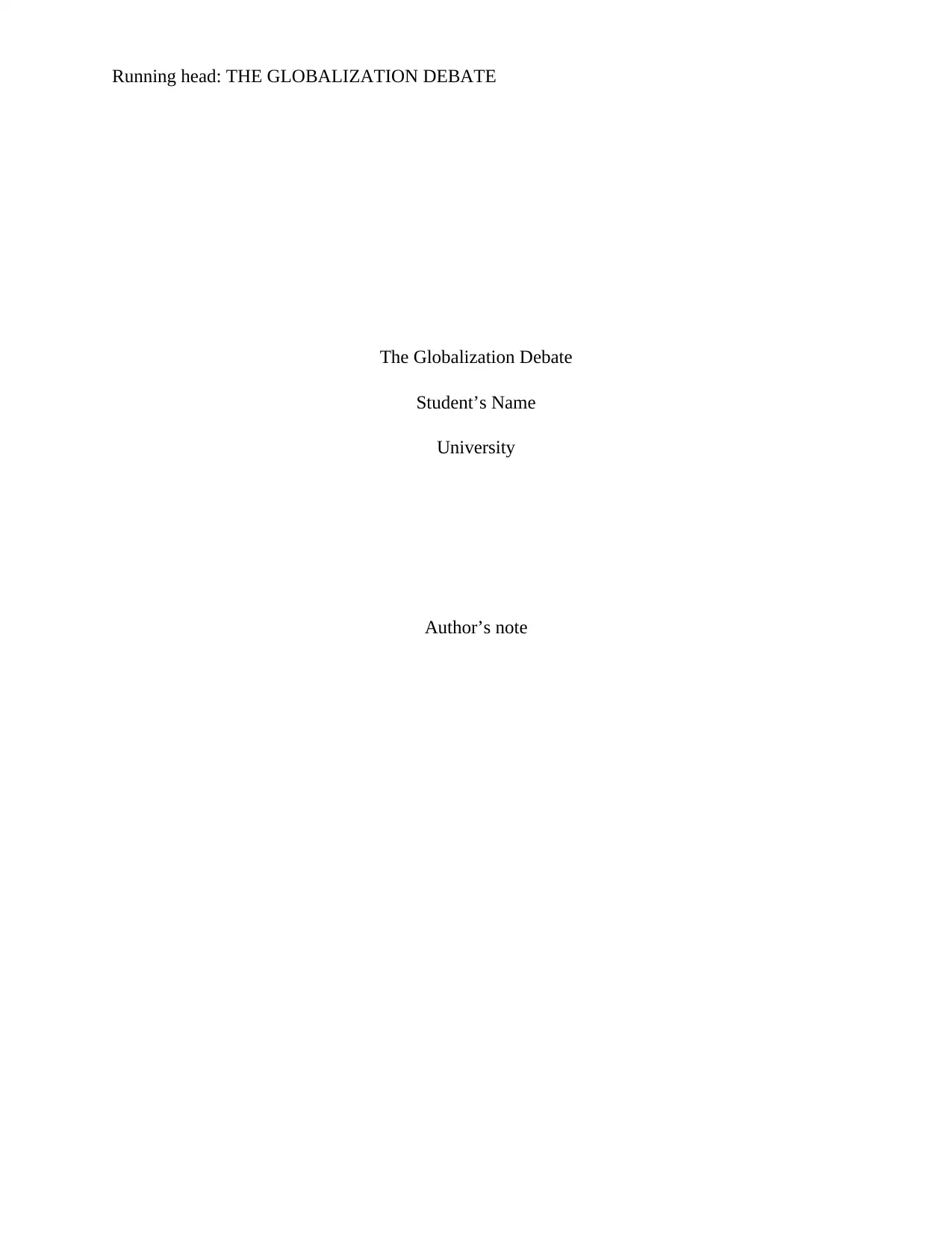
Running head: THE GLOBALIZATION DEBATE
The Globalization Debate
Student’s Name
University
Author’s note
The Globalization Debate
Student’s Name
University
Author’s note
Paraphrase This Document
Need a fresh take? Get an instant paraphrase of this document with our AI Paraphraser
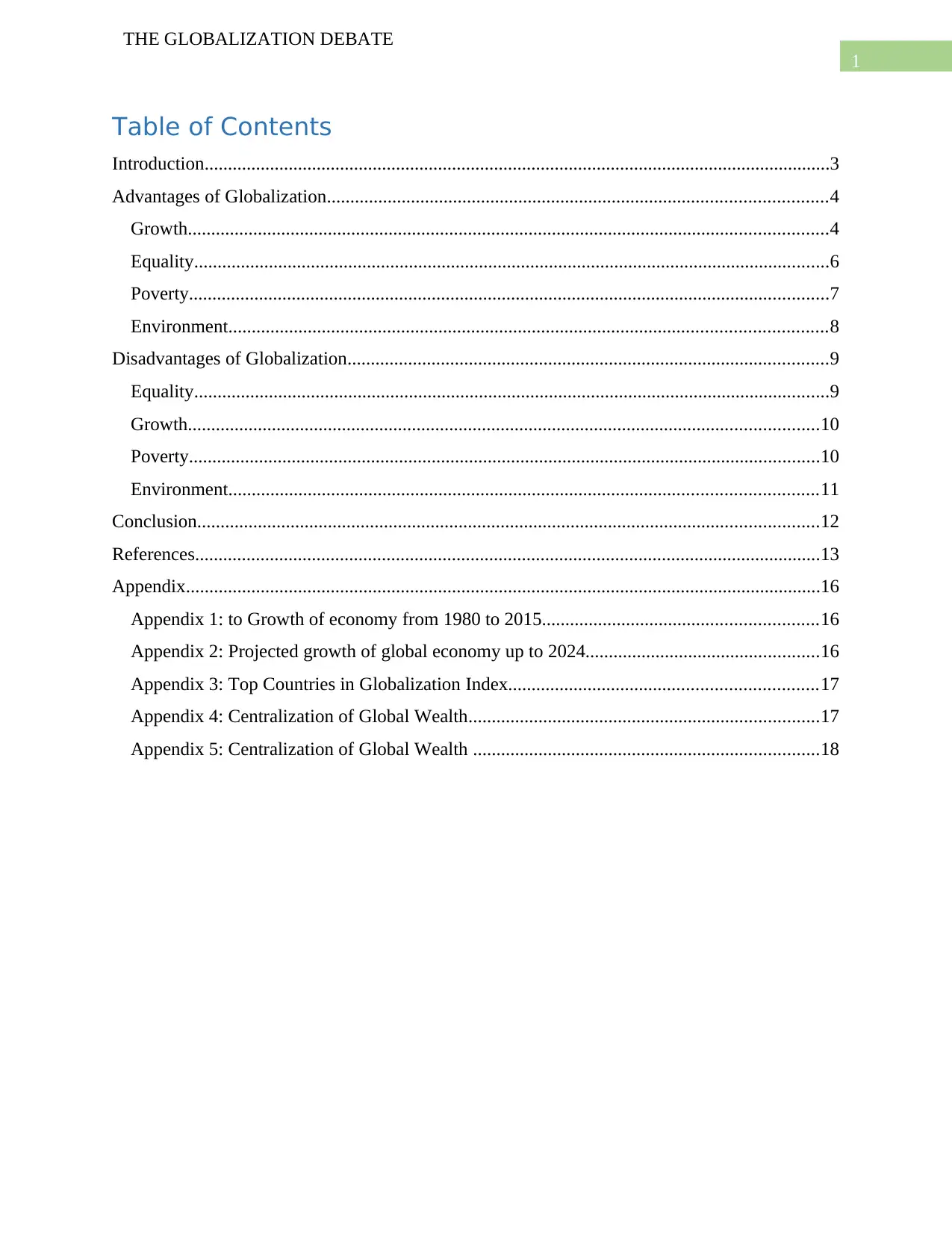
1
THE GLOBALIZATION DEBATE
Table of Contents
Introduction......................................................................................................................................3
Advantages of Globalization...........................................................................................................4
Growth.........................................................................................................................................4
Equality........................................................................................................................................6
Poverty.........................................................................................................................................7
Environment................................................................................................................................8
Disadvantages of Globalization.......................................................................................................9
Equality........................................................................................................................................9
Growth.......................................................................................................................................10
Poverty.......................................................................................................................................10
Environment..............................................................................................................................11
Conclusion.....................................................................................................................................12
References......................................................................................................................................13
Appendix........................................................................................................................................16
Appendix 1: to Growth of economy from 1980 to 2015...........................................................16
Appendix 2: Projected growth of global economy up to 2024..................................................16
Appendix 3: Top Countries in Globalization Index..................................................................17
Appendix 4: Centralization of Global Wealth...........................................................................17
Appendix 5: Centralization of Global Wealth ..........................................................................18
THE GLOBALIZATION DEBATE
Table of Contents
Introduction......................................................................................................................................3
Advantages of Globalization...........................................................................................................4
Growth.........................................................................................................................................4
Equality........................................................................................................................................6
Poverty.........................................................................................................................................7
Environment................................................................................................................................8
Disadvantages of Globalization.......................................................................................................9
Equality........................................................................................................................................9
Growth.......................................................................................................................................10
Poverty.......................................................................................................................................10
Environment..............................................................................................................................11
Conclusion.....................................................................................................................................12
References......................................................................................................................................13
Appendix........................................................................................................................................16
Appendix 1: to Growth of economy from 1980 to 2015...........................................................16
Appendix 2: Projected growth of global economy up to 2024..................................................16
Appendix 3: Top Countries in Globalization Index..................................................................17
Appendix 4: Centralization of Global Wealth...........................................................................17
Appendix 5: Centralization of Global Wealth ..........................................................................18
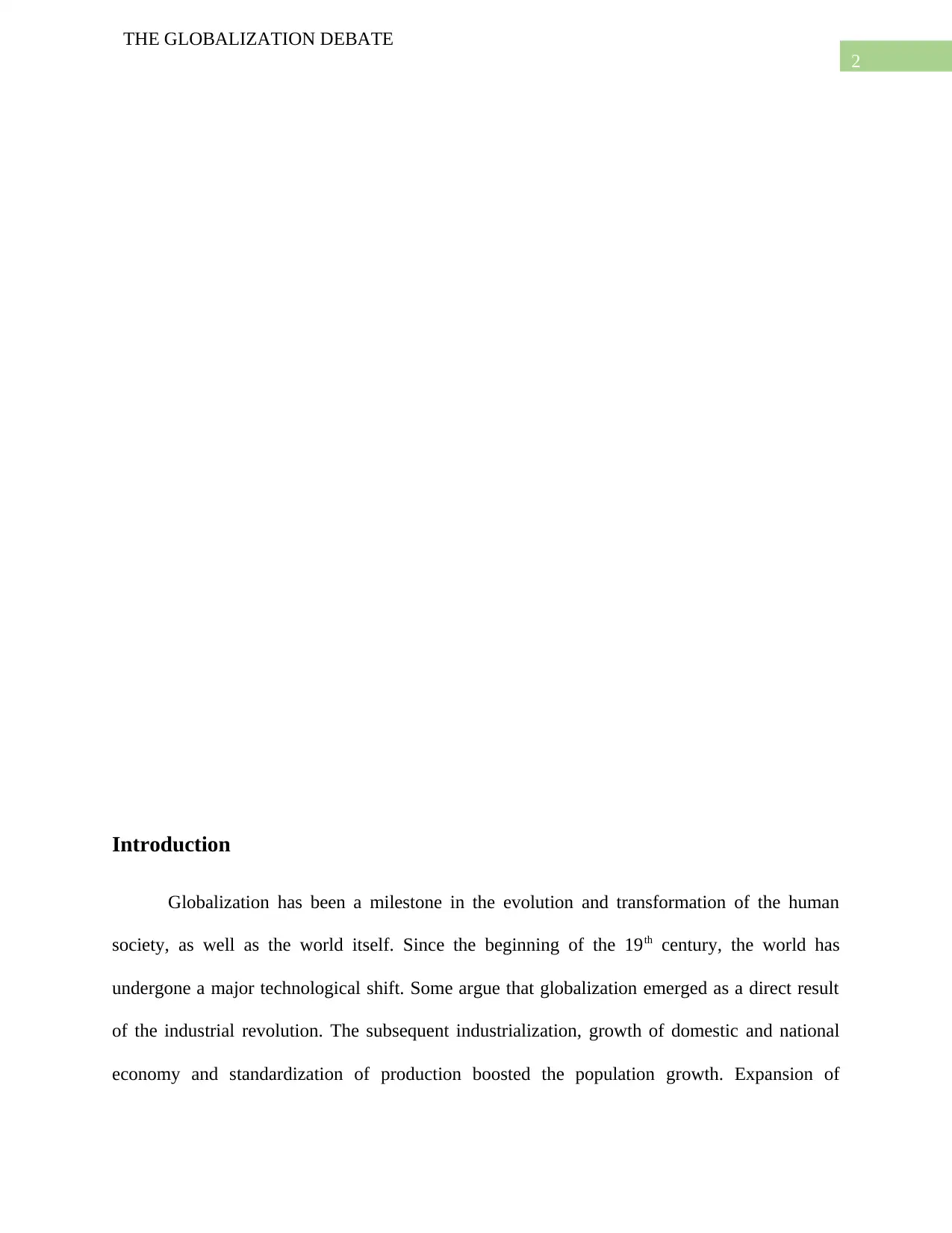
2
THE GLOBALIZATION DEBATE
Introduction
Globalization has been a milestone in the evolution and transformation of the human
society, as well as the world itself. Since the beginning of the 19th century, the world has
undergone a major technological shift. Some argue that globalization emerged as a direct result
of the industrial revolution. The subsequent industrialization, growth of domestic and national
economy and standardization of production boosted the population growth. Expansion of
THE GLOBALIZATION DEBATE
Introduction
Globalization has been a milestone in the evolution and transformation of the human
society, as well as the world itself. Since the beginning of the 19th century, the world has
undergone a major technological shift. Some argue that globalization emerged as a direct result
of the industrial revolution. The subsequent industrialization, growth of domestic and national
economy and standardization of production boosted the population growth. Expansion of
⊘ This is a preview!⊘
Do you want full access?
Subscribe today to unlock all pages.

Trusted by 1+ million students worldwide
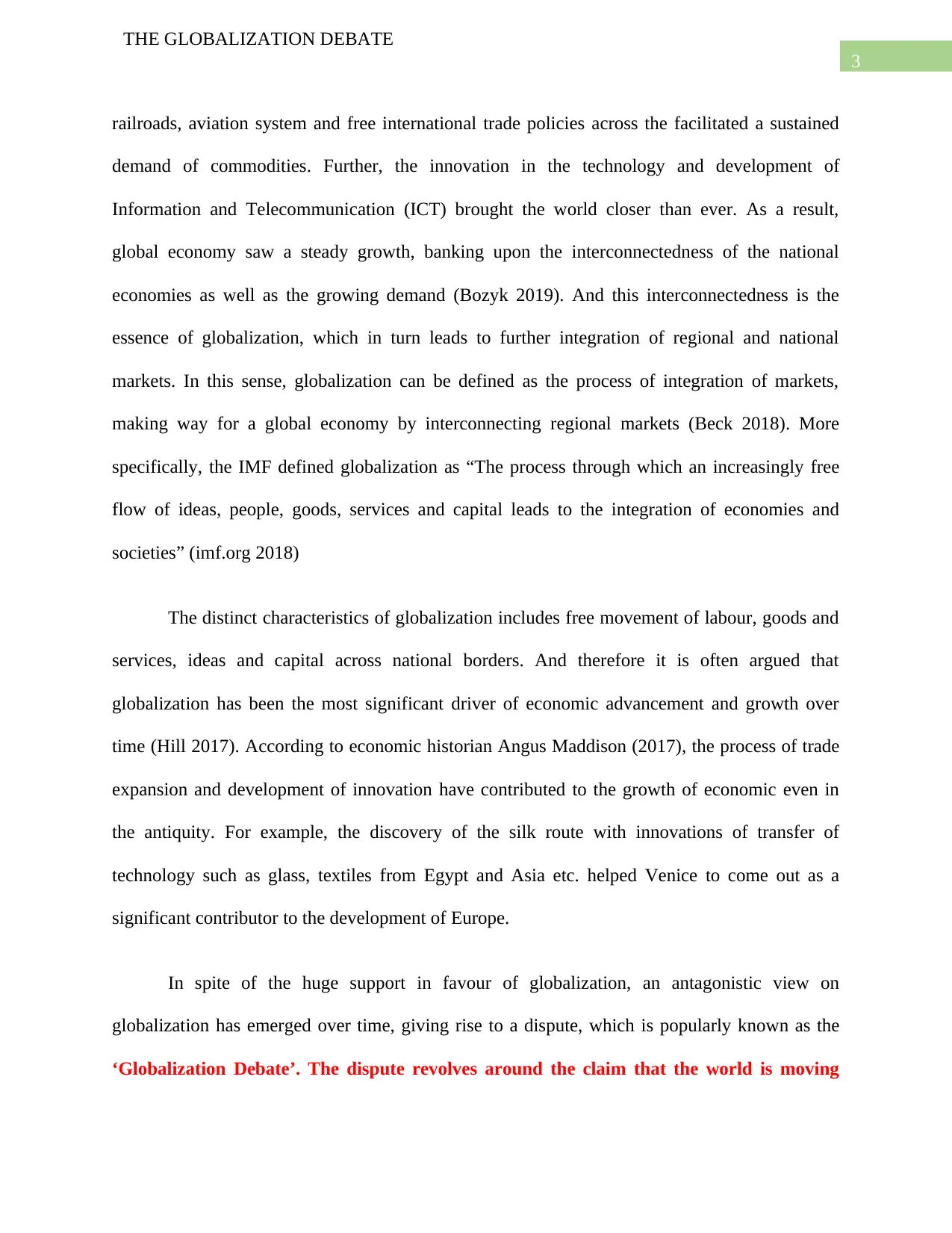
3
THE GLOBALIZATION DEBATE
railroads, aviation system and free international trade policies across the facilitated a sustained
demand of commodities. Further, the innovation in the technology and development of
Information and Telecommunication (ICT) brought the world closer than ever. As a result,
global economy saw a steady growth, banking upon the interconnectedness of the national
economies as well as the growing demand (Bozyk 2019). And this interconnectedness is the
essence of globalization, which in turn leads to further integration of regional and national
markets. In this sense, globalization can be defined as the process of integration of markets,
making way for a global economy by interconnecting regional markets (Beck 2018). More
specifically, the IMF defined globalization as “The process through which an increasingly free
flow of ideas, people, goods, services and capital leads to the integration of economies and
societies” (imf.org 2018)
The distinct characteristics of globalization includes free movement of labour, goods and
services, ideas and capital across national borders. And therefore it is often argued that
globalization has been the most significant driver of economic advancement and growth over
time (Hill 2017). According to economic historian Angus Maddison (2017), the process of trade
expansion and development of innovation have contributed to the growth of economic even in
the antiquity. For example, the discovery of the silk route with innovations of transfer of
technology such as glass, textiles from Egypt and Asia etc. helped Venice to come out as a
significant contributor to the development of Europe.
In spite of the huge support in favour of globalization, an antagonistic view on
globalization has emerged over time, giving rise to a dispute, which is popularly known as the
‘Globalization Debate’. The dispute revolves around the claim that the world is moving
THE GLOBALIZATION DEBATE
railroads, aviation system and free international trade policies across the facilitated a sustained
demand of commodities. Further, the innovation in the technology and development of
Information and Telecommunication (ICT) brought the world closer than ever. As a result,
global economy saw a steady growth, banking upon the interconnectedness of the national
economies as well as the growing demand (Bozyk 2019). And this interconnectedness is the
essence of globalization, which in turn leads to further integration of regional and national
markets. In this sense, globalization can be defined as the process of integration of markets,
making way for a global economy by interconnecting regional markets (Beck 2018). More
specifically, the IMF defined globalization as “The process through which an increasingly free
flow of ideas, people, goods, services and capital leads to the integration of economies and
societies” (imf.org 2018)
The distinct characteristics of globalization includes free movement of labour, goods and
services, ideas and capital across national borders. And therefore it is often argued that
globalization has been the most significant driver of economic advancement and growth over
time (Hill 2017). According to economic historian Angus Maddison (2017), the process of trade
expansion and development of innovation have contributed to the growth of economic even in
the antiquity. For example, the discovery of the silk route with innovations of transfer of
technology such as glass, textiles from Egypt and Asia etc. helped Venice to come out as a
significant contributor to the development of Europe.
In spite of the huge support in favour of globalization, an antagonistic view on
globalization has emerged over time, giving rise to a dispute, which is popularly known as the
‘Globalization Debate’. The dispute revolves around the claim that the world is moving
Paraphrase This Document
Need a fresh take? Get an instant paraphrase of this document with our AI Paraphraser
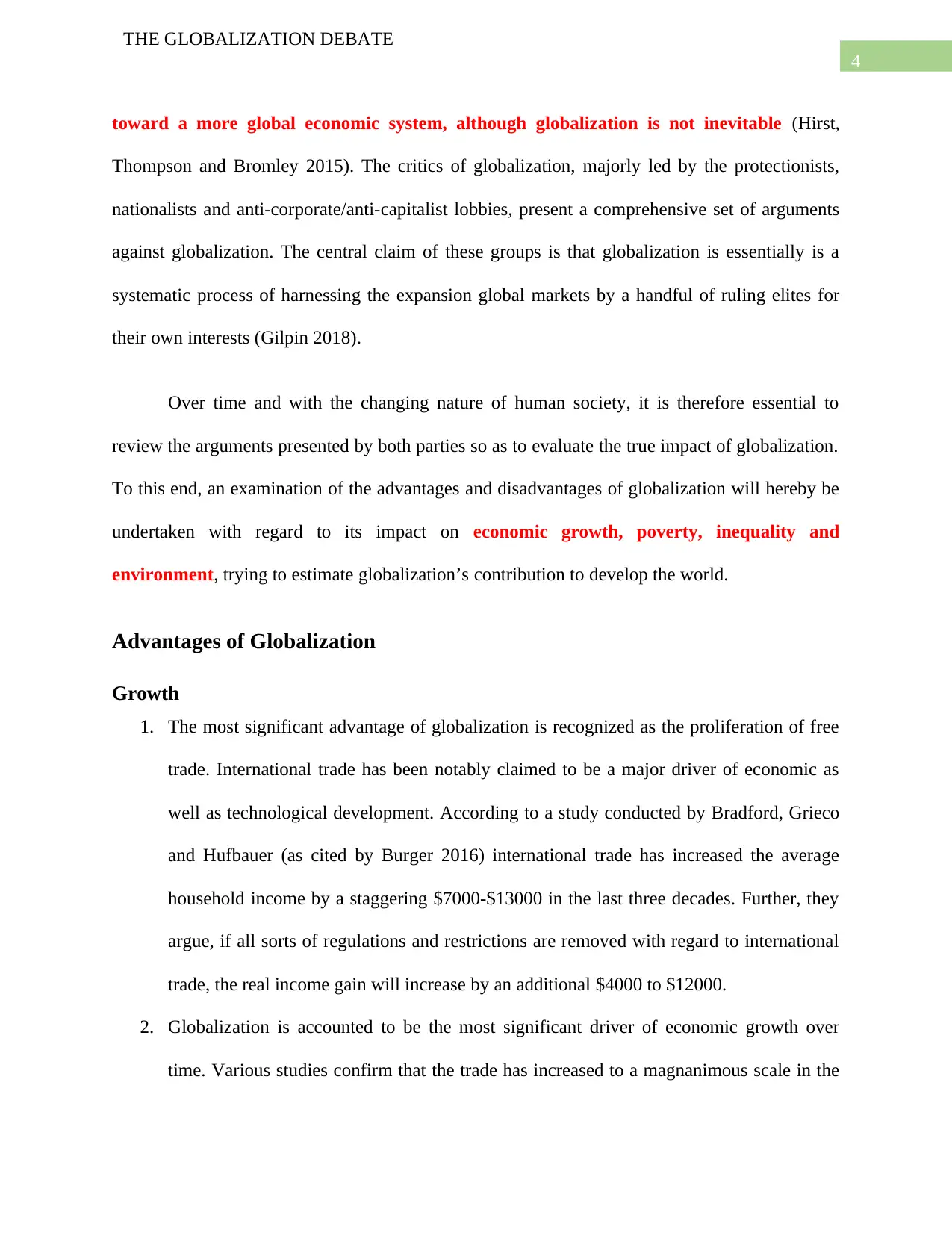
4
THE GLOBALIZATION DEBATE
toward a more global economic system, although globalization is not inevitable (Hirst,
Thompson and Bromley 2015). The critics of globalization, majorly led by the protectionists,
nationalists and anti-corporate/anti-capitalist lobbies, present a comprehensive set of arguments
against globalization. The central claim of these groups is that globalization is essentially is a
systematic process of harnessing the expansion global markets by a handful of ruling elites for
their own interests (Gilpin 2018).
Over time and with the changing nature of human society, it is therefore essential to
review the arguments presented by both parties so as to evaluate the true impact of globalization.
To this end, an examination of the advantages and disadvantages of globalization will hereby be
undertaken with regard to its impact on economic growth, poverty, inequality and
environment, trying to estimate globalization’s contribution to develop the world.
Advantages of Globalization
Growth
1. The most significant advantage of globalization is recognized as the proliferation of free
trade. International trade has been notably claimed to be a major driver of economic as
well as technological development. According to a study conducted by Bradford, Grieco
and Hufbauer (as cited by Burger 2016) international trade has increased the average
household income by a staggering $7000-$13000 in the last three decades. Further, they
argue, if all sorts of regulations and restrictions are removed with regard to international
trade, the real income gain will increase by an additional $4000 to $12000.
2. Globalization is accounted to be the most significant driver of economic growth over
time. Various studies confirm that the trade has increased to a magnanimous scale in the
THE GLOBALIZATION DEBATE
toward a more global economic system, although globalization is not inevitable (Hirst,
Thompson and Bromley 2015). The critics of globalization, majorly led by the protectionists,
nationalists and anti-corporate/anti-capitalist lobbies, present a comprehensive set of arguments
against globalization. The central claim of these groups is that globalization is essentially is a
systematic process of harnessing the expansion global markets by a handful of ruling elites for
their own interests (Gilpin 2018).
Over time and with the changing nature of human society, it is therefore essential to
review the arguments presented by both parties so as to evaluate the true impact of globalization.
To this end, an examination of the advantages and disadvantages of globalization will hereby be
undertaken with regard to its impact on economic growth, poverty, inequality and
environment, trying to estimate globalization’s contribution to develop the world.
Advantages of Globalization
Growth
1. The most significant advantage of globalization is recognized as the proliferation of free
trade. International trade has been notably claimed to be a major driver of economic as
well as technological development. According to a study conducted by Bradford, Grieco
and Hufbauer (as cited by Burger 2016) international trade has increased the average
household income by a staggering $7000-$13000 in the last three decades. Further, they
argue, if all sorts of regulations and restrictions are removed with regard to international
trade, the real income gain will increase by an additional $4000 to $12000.
2. Globalization is accounted to be the most significant driver of economic growth over
time. Various studies confirm that the trade has increased to a magnanimous scale in the
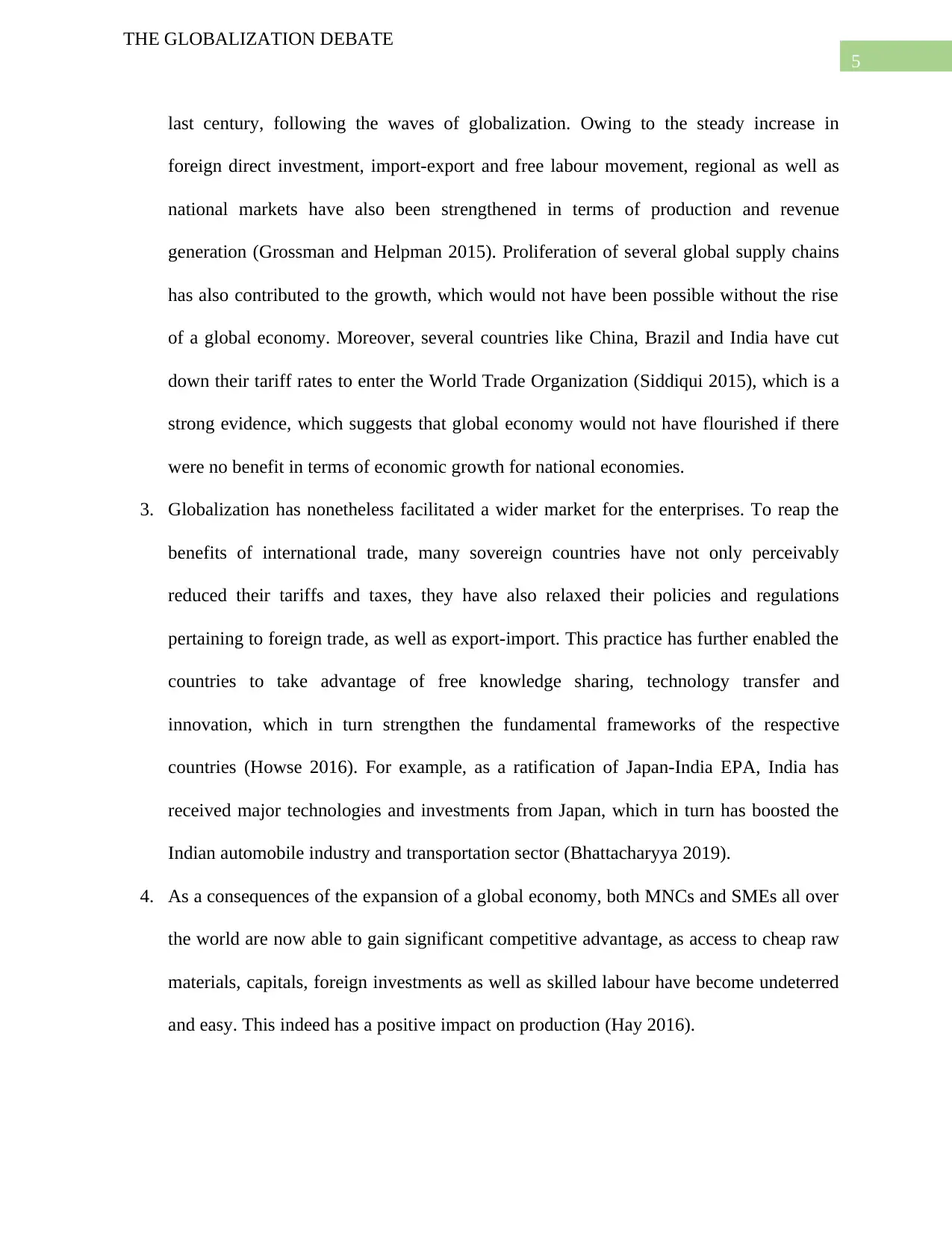
5
THE GLOBALIZATION DEBATE
last century, following the waves of globalization. Owing to the steady increase in
foreign direct investment, import-export and free labour movement, regional as well as
national markets have also been strengthened in terms of production and revenue
generation (Grossman and Helpman 2015). Proliferation of several global supply chains
has also contributed to the growth, which would not have been possible without the rise
of a global economy. Moreover, several countries like China, Brazil and India have cut
down their tariff rates to enter the World Trade Organization (Siddiqui 2015), which is a
strong evidence, which suggests that global economy would not have flourished if there
were no benefit in terms of economic growth for national economies.
3. Globalization has nonetheless facilitated a wider market for the enterprises. To reap the
benefits of international trade, many sovereign countries have not only perceivably
reduced their tariffs and taxes, they have also relaxed their policies and regulations
pertaining to foreign trade, as well as export-import. This practice has further enabled the
countries to take advantage of free knowledge sharing, technology transfer and
innovation, which in turn strengthen the fundamental frameworks of the respective
countries (Howse 2016). For example, as a ratification of Japan-India EPA, India has
received major technologies and investments from Japan, which in turn has boosted the
Indian automobile industry and transportation sector (Bhattacharyya 2019).
4. As a consequences of the expansion of a global economy, both MNCs and SMEs all over
the world are now able to gain significant competitive advantage, as access to cheap raw
materials, capitals, foreign investments as well as skilled labour have become undeterred
and easy. This indeed has a positive impact on production (Hay 2016).
THE GLOBALIZATION DEBATE
last century, following the waves of globalization. Owing to the steady increase in
foreign direct investment, import-export and free labour movement, regional as well as
national markets have also been strengthened in terms of production and revenue
generation (Grossman and Helpman 2015). Proliferation of several global supply chains
has also contributed to the growth, which would not have been possible without the rise
of a global economy. Moreover, several countries like China, Brazil and India have cut
down their tariff rates to enter the World Trade Organization (Siddiqui 2015), which is a
strong evidence, which suggests that global economy would not have flourished if there
were no benefit in terms of economic growth for national economies.
3. Globalization has nonetheless facilitated a wider market for the enterprises. To reap the
benefits of international trade, many sovereign countries have not only perceivably
reduced their tariffs and taxes, they have also relaxed their policies and regulations
pertaining to foreign trade, as well as export-import. This practice has further enabled the
countries to take advantage of free knowledge sharing, technology transfer and
innovation, which in turn strengthen the fundamental frameworks of the respective
countries (Howse 2016). For example, as a ratification of Japan-India EPA, India has
received major technologies and investments from Japan, which in turn has boosted the
Indian automobile industry and transportation sector (Bhattacharyya 2019).
4. As a consequences of the expansion of a global economy, both MNCs and SMEs all over
the world are now able to gain significant competitive advantage, as access to cheap raw
materials, capitals, foreign investments as well as skilled labour have become undeterred
and easy. This indeed has a positive impact on production (Hay 2016).
⊘ This is a preview!⊘
Do you want full access?
Subscribe today to unlock all pages.

Trusted by 1+ million students worldwide

6
THE GLOBALIZATION DEBATE
5. This global market has positively influenced the production in a two-fold way. First, as a
result of wider access to consumers, claustrophobic competition in the regional markets
have decreased, by enabling enterprises to explore overseas markets as well. On the other
hand, increased demand of commodities nevertheless acts as a driver of increased
production (Hirst, Thompson and Bromley 2015).
6. International trade also allows a country to specialize on its strong sectors, facilitating a
comparative advantage over other countries. Moreover, globalization is also expected to
increase efficiency and skill, allowing the enterprises to be more self-reliant and efficient,
protecting themselves from the overt competition (Grossman and Helpman 2015).
Equality
1. Owing to the cost reduction, increased market demand, as well as the cheap
availability of skilled labour, the enterprises are expected to generate a significant
amount of revenue, benefitting the shareholders as well (Eriksen 2018).
2. Apart from the shareholders, the labourers and the skilled workforce are also
expected to benefit from the international trade expansion, as the enterprises require
more access to skilled labour to meet the increased demand of the market (Eriksen
2018).
3. As far as customers are concerned, market expansion will make access to quality
goods and services at comparatively lower prices. Also, there will be less chances of
market monopoly so that consumers can avail the commodities at right price. It also
ensures quality increase and the subsequent quality maintenance, which nevertheless
is a benefit for the customers (Eriksen 2018).
THE GLOBALIZATION DEBATE
5. This global market has positively influenced the production in a two-fold way. First, as a
result of wider access to consumers, claustrophobic competition in the regional markets
have decreased, by enabling enterprises to explore overseas markets as well. On the other
hand, increased demand of commodities nevertheless acts as a driver of increased
production (Hirst, Thompson and Bromley 2015).
6. International trade also allows a country to specialize on its strong sectors, facilitating a
comparative advantage over other countries. Moreover, globalization is also expected to
increase efficiency and skill, allowing the enterprises to be more self-reliant and efficient,
protecting themselves from the overt competition (Grossman and Helpman 2015).
Equality
1. Owing to the cost reduction, increased market demand, as well as the cheap
availability of skilled labour, the enterprises are expected to generate a significant
amount of revenue, benefitting the shareholders as well (Eriksen 2018).
2. Apart from the shareholders, the labourers and the skilled workforce are also
expected to benefit from the international trade expansion, as the enterprises require
more access to skilled labour to meet the increased demand of the market (Eriksen
2018).
3. As far as customers are concerned, market expansion will make access to quality
goods and services at comparatively lower prices. Also, there will be less chances of
market monopoly so that consumers can avail the commodities at right price. It also
ensures quality increase and the subsequent quality maintenance, which nevertheless
is a benefit for the customers (Eriksen 2018).
Paraphrase This Document
Need a fresh take? Get an instant paraphrase of this document with our AI Paraphraser
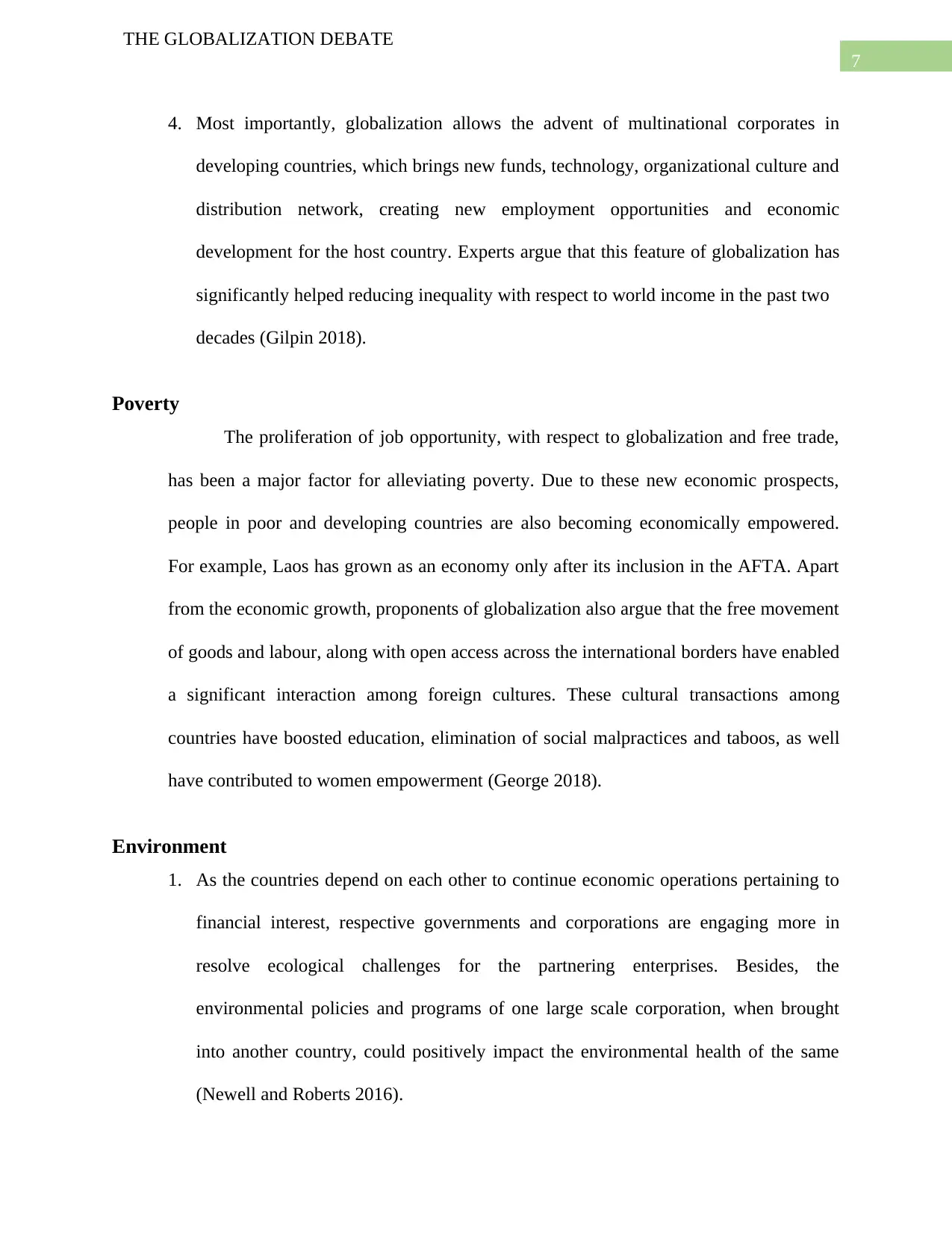
7
THE GLOBALIZATION DEBATE
4. Most importantly, globalization allows the advent of multinational corporates in
developing countries, which brings new funds, technology, organizational culture and
distribution network, creating new employment opportunities and economic
development for the host country. Experts argue that this feature of globalization has
significantly helped reducing inequality with respect to world income in the past two
decades (Gilpin 2018).
Poverty
The proliferation of job opportunity, with respect to globalization and free trade,
has been a major factor for alleviating poverty. Due to these new economic prospects,
people in poor and developing countries are also becoming economically empowered.
For example, Laos has grown as an economy only after its inclusion in the AFTA. Apart
from the economic growth, proponents of globalization also argue that the free movement
of goods and labour, along with open access across the international borders have enabled
a significant interaction among foreign cultures. These cultural transactions among
countries have boosted education, elimination of social malpractices and taboos, as well
have contributed to women empowerment (George 2018).
Environment
1. As the countries depend on each other to continue economic operations pertaining to
financial interest, respective governments and corporations are engaging more in
resolve ecological challenges for the partnering enterprises. Besides, the
environmental policies and programs of one large scale corporation, when brought
into another country, could positively impact the environmental health of the same
(Newell and Roberts 2016).
THE GLOBALIZATION DEBATE
4. Most importantly, globalization allows the advent of multinational corporates in
developing countries, which brings new funds, technology, organizational culture and
distribution network, creating new employment opportunities and economic
development for the host country. Experts argue that this feature of globalization has
significantly helped reducing inequality with respect to world income in the past two
decades (Gilpin 2018).
Poverty
The proliferation of job opportunity, with respect to globalization and free trade,
has been a major factor for alleviating poverty. Due to these new economic prospects,
people in poor and developing countries are also becoming economically empowered.
For example, Laos has grown as an economy only after its inclusion in the AFTA. Apart
from the economic growth, proponents of globalization also argue that the free movement
of goods and labour, along with open access across the international borders have enabled
a significant interaction among foreign cultures. These cultural transactions among
countries have boosted education, elimination of social malpractices and taboos, as well
have contributed to women empowerment (George 2018).
Environment
1. As the countries depend on each other to continue economic operations pertaining to
financial interest, respective governments and corporations are engaging more in
resolve ecological challenges for the partnering enterprises. Besides, the
environmental policies and programs of one large scale corporation, when brought
into another country, could positively impact the environmental health of the same
(Newell and Roberts 2016).
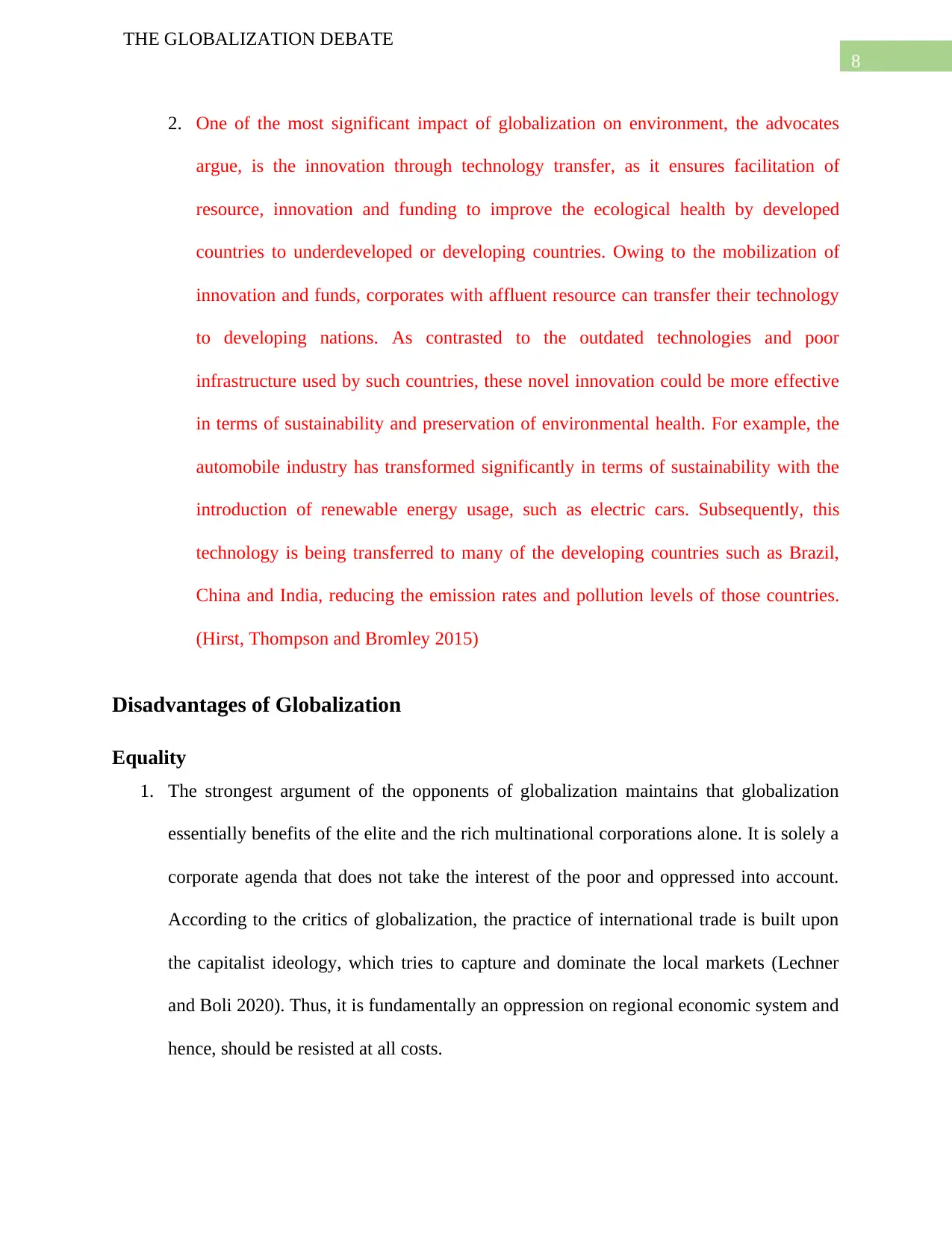
8
THE GLOBALIZATION DEBATE
2. One of the most significant impact of globalization on environment, the advocates
argue, is the innovation through technology transfer, as it ensures facilitation of
resource, innovation and funding to improve the ecological health by developed
countries to underdeveloped or developing countries. Owing to the mobilization of
innovation and funds, corporates with affluent resource can transfer their technology
to developing nations. As contrasted to the outdated technologies and poor
infrastructure used by such countries, these novel innovation could be more effective
in terms of sustainability and preservation of environmental health. For example, the
automobile industry has transformed significantly in terms of sustainability with the
introduction of renewable energy usage, such as electric cars. Subsequently, this
technology is being transferred to many of the developing countries such as Brazil,
China and India, reducing the emission rates and pollution levels of those countries.
(Hirst, Thompson and Bromley 2015)
Disadvantages of Globalization
Equality
1. The strongest argument of the opponents of globalization maintains that globalization
essentially benefits of the elite and the rich multinational corporations alone. It is solely a
corporate agenda that does not take the interest of the poor and oppressed into account.
According to the critics of globalization, the practice of international trade is built upon
the capitalist ideology, which tries to capture and dominate the local markets (Lechner
and Boli 2020). Thus, it is fundamentally an oppression on regional economic system and
hence, should be resisted at all costs.
THE GLOBALIZATION DEBATE
2. One of the most significant impact of globalization on environment, the advocates
argue, is the innovation through technology transfer, as it ensures facilitation of
resource, innovation and funding to improve the ecological health by developed
countries to underdeveloped or developing countries. Owing to the mobilization of
innovation and funds, corporates with affluent resource can transfer their technology
to developing nations. As contrasted to the outdated technologies and poor
infrastructure used by such countries, these novel innovation could be more effective
in terms of sustainability and preservation of environmental health. For example, the
automobile industry has transformed significantly in terms of sustainability with the
introduction of renewable energy usage, such as electric cars. Subsequently, this
technology is being transferred to many of the developing countries such as Brazil,
China and India, reducing the emission rates and pollution levels of those countries.
(Hirst, Thompson and Bromley 2015)
Disadvantages of Globalization
Equality
1. The strongest argument of the opponents of globalization maintains that globalization
essentially benefits of the elite and the rich multinational corporations alone. It is solely a
corporate agenda that does not take the interest of the poor and oppressed into account.
According to the critics of globalization, the practice of international trade is built upon
the capitalist ideology, which tries to capture and dominate the local markets (Lechner
and Boli 2020). Thus, it is fundamentally an oppression on regional economic system and
hence, should be resisted at all costs.
⊘ This is a preview!⊘
Do you want full access?
Subscribe today to unlock all pages.

Trusted by 1+ million students worldwide
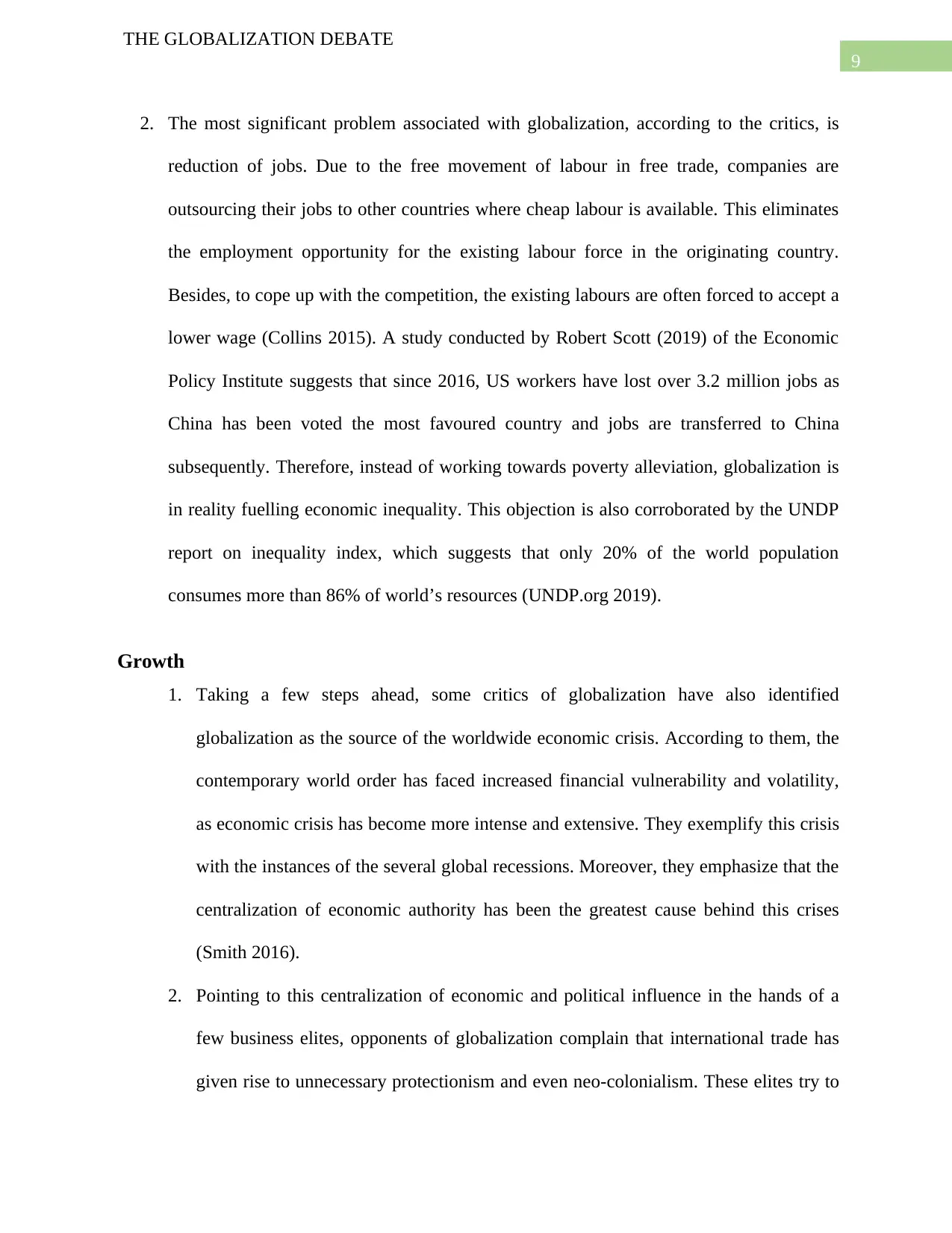
9
THE GLOBALIZATION DEBATE
2. The most significant problem associated with globalization, according to the critics, is
reduction of jobs. Due to the free movement of labour in free trade, companies are
outsourcing their jobs to other countries where cheap labour is available. This eliminates
the employment opportunity for the existing labour force in the originating country.
Besides, to cope up with the competition, the existing labours are often forced to accept a
lower wage (Collins 2015). A study conducted by Robert Scott (2019) of the Economic
Policy Institute suggests that since 2016, US workers have lost over 3.2 million jobs as
China has been voted the most favoured country and jobs are transferred to China
subsequently. Therefore, instead of working towards poverty alleviation, globalization is
in reality fuelling economic inequality. This objection is also corroborated by the UNDP
report on inequality index, which suggests that only 20% of the world population
consumes more than 86% of world’s resources (UNDP.org 2019).
Growth
1. Taking a few steps ahead, some critics of globalization have also identified
globalization as the source of the worldwide economic crisis. According to them, the
contemporary world order has faced increased financial vulnerability and volatility,
as economic crisis has become more intense and extensive. They exemplify this crisis
with the instances of the several global recessions. Moreover, they emphasize that the
centralization of economic authority has been the greatest cause behind this crises
(Smith 2016).
2. Pointing to this centralization of economic and political influence in the hands of a
few business elites, opponents of globalization complain that international trade has
given rise to unnecessary protectionism and even neo-colonialism. These elites try to
THE GLOBALIZATION DEBATE
2. The most significant problem associated with globalization, according to the critics, is
reduction of jobs. Due to the free movement of labour in free trade, companies are
outsourcing their jobs to other countries where cheap labour is available. This eliminates
the employment opportunity for the existing labour force in the originating country.
Besides, to cope up with the competition, the existing labours are often forced to accept a
lower wage (Collins 2015). A study conducted by Robert Scott (2019) of the Economic
Policy Institute suggests that since 2016, US workers have lost over 3.2 million jobs as
China has been voted the most favoured country and jobs are transferred to China
subsequently. Therefore, instead of working towards poverty alleviation, globalization is
in reality fuelling economic inequality. This objection is also corroborated by the UNDP
report on inequality index, which suggests that only 20% of the world population
consumes more than 86% of world’s resources (UNDP.org 2019).
Growth
1. Taking a few steps ahead, some critics of globalization have also identified
globalization as the source of the worldwide economic crisis. According to them, the
contemporary world order has faced increased financial vulnerability and volatility,
as economic crisis has become more intense and extensive. They exemplify this crisis
with the instances of the several global recessions. Moreover, they emphasize that the
centralization of economic authority has been the greatest cause behind this crises
(Smith 2016).
2. Pointing to this centralization of economic and political influence in the hands of a
few business elites, opponents of globalization complain that international trade has
given rise to unnecessary protectionism and even neo-colonialism. These elites try to
Paraphrase This Document
Need a fresh take? Get an instant paraphrase of this document with our AI Paraphraser
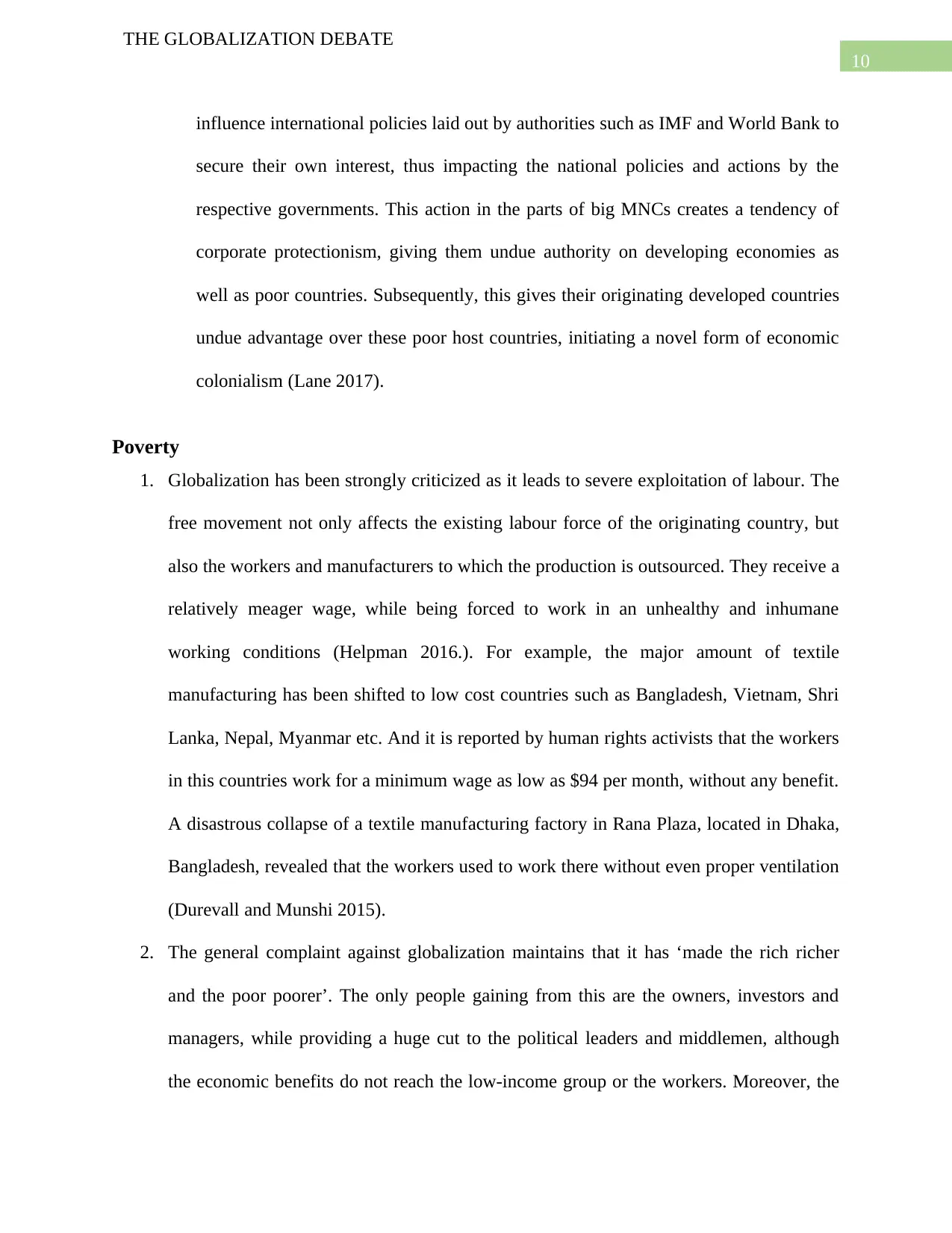
10
THE GLOBALIZATION DEBATE
influence international policies laid out by authorities such as IMF and World Bank to
secure their own interest, thus impacting the national policies and actions by the
respective governments. This action in the parts of big MNCs creates a tendency of
corporate protectionism, giving them undue authority on developing economies as
well as poor countries. Subsequently, this gives their originating developed countries
undue advantage over these poor host countries, initiating a novel form of economic
colonialism (Lane 2017).
Poverty
1. Globalization has been strongly criticized as it leads to severe exploitation of labour. The
free movement not only affects the existing labour force of the originating country, but
also the workers and manufacturers to which the production is outsourced. They receive a
relatively meager wage, while being forced to work in an unhealthy and inhumane
working conditions (Helpman 2016.). For example, the major amount of textile
manufacturing has been shifted to low cost countries such as Bangladesh, Vietnam, Shri
Lanka, Nepal, Myanmar etc. And it is reported by human rights activists that the workers
in this countries work for a minimum wage as low as $94 per month, without any benefit.
A disastrous collapse of a textile manufacturing factory in Rana Plaza, located in Dhaka,
Bangladesh, revealed that the workers used to work there without even proper ventilation
(Durevall and Munshi 2015).
2. The general complaint against globalization maintains that it has ‘made the rich richer
and the poor poorer’. The only people gaining from this are the owners, investors and
managers, while providing a huge cut to the political leaders and middlemen, although
the economic benefits do not reach the low-income group or the workers. Moreover, the
THE GLOBALIZATION DEBATE
influence international policies laid out by authorities such as IMF and World Bank to
secure their own interest, thus impacting the national policies and actions by the
respective governments. This action in the parts of big MNCs creates a tendency of
corporate protectionism, giving them undue authority on developing economies as
well as poor countries. Subsequently, this gives their originating developed countries
undue advantage over these poor host countries, initiating a novel form of economic
colonialism (Lane 2017).
Poverty
1. Globalization has been strongly criticized as it leads to severe exploitation of labour. The
free movement not only affects the existing labour force of the originating country, but
also the workers and manufacturers to which the production is outsourced. They receive a
relatively meager wage, while being forced to work in an unhealthy and inhumane
working conditions (Helpman 2016.). For example, the major amount of textile
manufacturing has been shifted to low cost countries such as Bangladesh, Vietnam, Shri
Lanka, Nepal, Myanmar etc. And it is reported by human rights activists that the workers
in this countries work for a minimum wage as low as $94 per month, without any benefit.
A disastrous collapse of a textile manufacturing factory in Rana Plaza, located in Dhaka,
Bangladesh, revealed that the workers used to work there without even proper ventilation
(Durevall and Munshi 2015).
2. The general complaint against globalization maintains that it has ‘made the rich richer
and the poor poorer’. The only people gaining from this are the owners, investors and
managers, while providing a huge cut to the political leaders and middlemen, although
the economic benefits do not reach the low-income group or the workers. Moreover, the
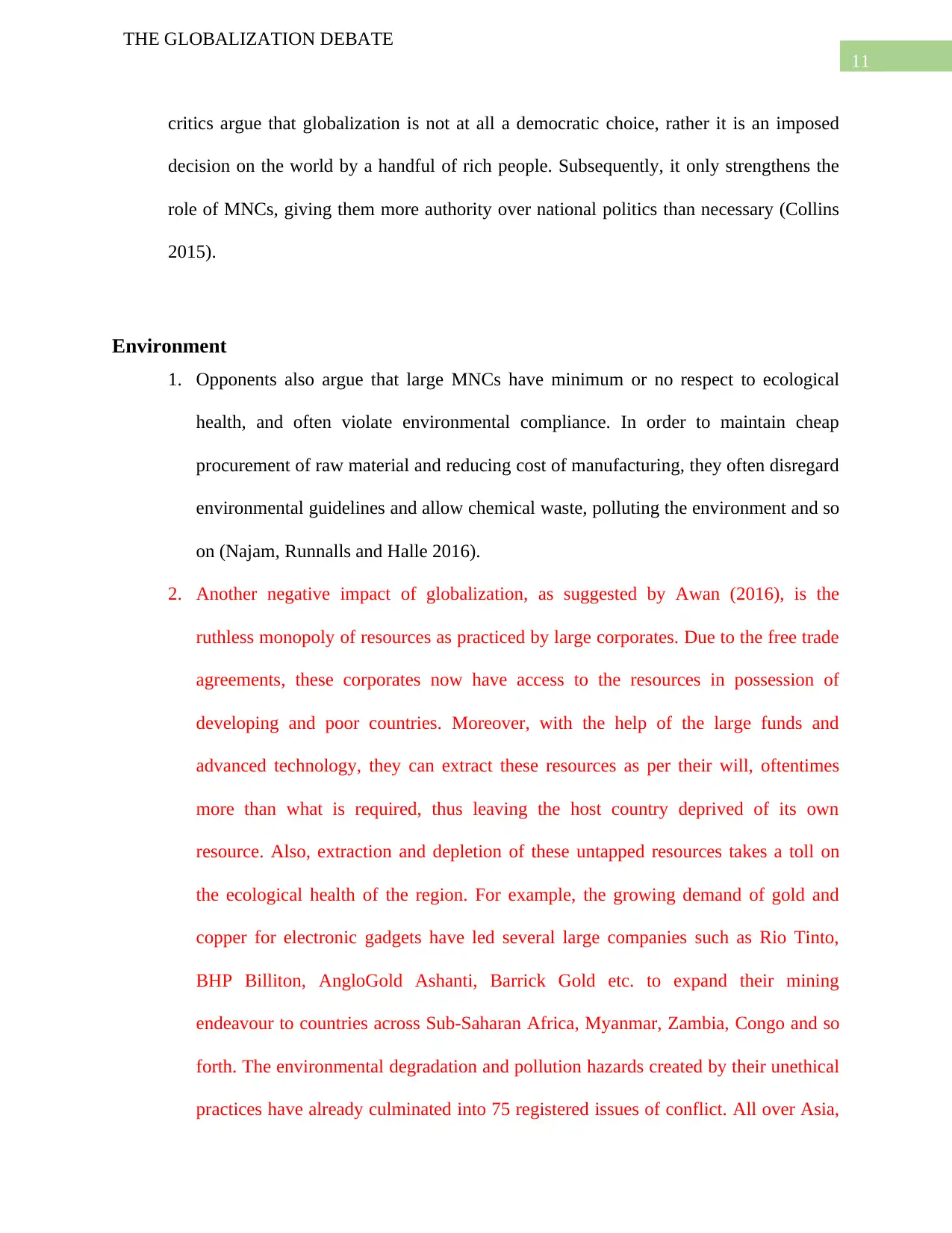
11
THE GLOBALIZATION DEBATE
critics argue that globalization is not at all a democratic choice, rather it is an imposed
decision on the world by a handful of rich people. Subsequently, it only strengthens the
role of MNCs, giving them more authority over national politics than necessary (Collins
2015).
Environment
1. Opponents also argue that large MNCs have minimum or no respect to ecological
health, and often violate environmental compliance. In order to maintain cheap
procurement of raw material and reducing cost of manufacturing, they often disregard
environmental guidelines and allow chemical waste, polluting the environment and so
on (Najam, Runnalls and Halle 2016).
2. Another negative impact of globalization, as suggested by Awan (2016), is the
ruthless monopoly of resources as practiced by large corporates. Due to the free trade
agreements, these corporates now have access to the resources in possession of
developing and poor countries. Moreover, with the help of the large funds and
advanced technology, they can extract these resources as per their will, oftentimes
more than what is required, thus leaving the host country deprived of its own
resource. Also, extraction and depletion of these untapped resources takes a toll on
the ecological health of the region. For example, the growing demand of gold and
copper for electronic gadgets have led several large companies such as Rio Tinto,
BHP Billiton, AngloGold Ashanti, Barrick Gold etc. to expand their mining
endeavour to countries across Sub-Saharan Africa, Myanmar, Zambia, Congo and so
forth. The environmental degradation and pollution hazards created by their unethical
practices have already culminated into 75 registered issues of conflict. All over Asia,
THE GLOBALIZATION DEBATE
critics argue that globalization is not at all a democratic choice, rather it is an imposed
decision on the world by a handful of rich people. Subsequently, it only strengthens the
role of MNCs, giving them more authority over national politics than necessary (Collins
2015).
Environment
1. Opponents also argue that large MNCs have minimum or no respect to ecological
health, and often violate environmental compliance. In order to maintain cheap
procurement of raw material and reducing cost of manufacturing, they often disregard
environmental guidelines and allow chemical waste, polluting the environment and so
on (Najam, Runnalls and Halle 2016).
2. Another negative impact of globalization, as suggested by Awan (2016), is the
ruthless monopoly of resources as practiced by large corporates. Due to the free trade
agreements, these corporates now have access to the resources in possession of
developing and poor countries. Moreover, with the help of the large funds and
advanced technology, they can extract these resources as per their will, oftentimes
more than what is required, thus leaving the host country deprived of its own
resource. Also, extraction and depletion of these untapped resources takes a toll on
the ecological health of the region. For example, the growing demand of gold and
copper for electronic gadgets have led several large companies such as Rio Tinto,
BHP Billiton, AngloGold Ashanti, Barrick Gold etc. to expand their mining
endeavour to countries across Sub-Saharan Africa, Myanmar, Zambia, Congo and so
forth. The environmental degradation and pollution hazards created by their unethical
practices have already culminated into 75 registered issues of conflict. All over Asia,
⊘ This is a preview!⊘
Do you want full access?
Subscribe today to unlock all pages.

Trusted by 1+ million students worldwide
1 out of 18
Related Documents
Your All-in-One AI-Powered Toolkit for Academic Success.
+13062052269
info@desklib.com
Available 24*7 on WhatsApp / Email
![[object Object]](/_next/static/media/star-bottom.7253800d.svg)
Unlock your academic potential
Copyright © 2020–2026 A2Z Services. All Rights Reserved. Developed and managed by ZUCOL.





